- Home
- Stephanie Laurens
The Ideal Bride Page 9
The Ideal Bride Read online
Page 9
Inclining her head, she tucked her hand in the crook of his arm; he resisted the urge to draw it further and cover it with his, to draw her closer. They descended the steps and started strolling.
Lifting her head, Caro focused on the trees lining the drive and forced her mind to the myriad details of organizing the ball—away from the hideously distracting presence beside her. Her lungs had seized again; it was a wonder she could speak. “The Swedes definitely.” She threw him a glance. “I won’t wish General Kleber on you—we’ll keep the Prussians at Bramshaw. The grand duchess will almost certainly attend, and she’ll expect to stay with me.”
She continued working through the guest list; grappling with logistics did, indeed, make it easier to cope with Michael’s nearness. He gave her no cause to panic further, but asked intelligent questions, ones she could answer. He had met, or knew of, most of those she intended to invite; he was aware of the undercurrents between the various groups.
They strolled down a path between the trees, then circled through the extensive shrubbery, eventually reemerging onto the drive not far from the terrace from which they’d set out.
“I’ve a confession to make,” Michael said as they climbed the terrace steps.
She glanced at him. “Oh?”
He met her gaze, and she was struck by a dreadful suspicion that he could see through her social shield. Her lungs locked; her nerves tensed. His gaze traveled her face, but then he smiled, an easy, comfortable, and to her comforting, gesture.
“Despite making me promise to open the fete, Muriel neglected to mention when the event is.” His eyes returned to hers, full of self-deprecatory laughter. “Rescue me—when is it?”
She laughed, felt the tension that had gripped her dissolve. Found she could meet his eyes with genuine ease. “A week from tomorrow.”
“So”—gaining the terrace, he waved her to the wrought-iron table now set with luncheon dishes—“your ball would be a week from tonight.”
“Yes.” She sat in the chair he held for her, then waited until he took the one opposite before launching into details of the ball itself; she’d saved that subject so she’d have something to keep him occupied. “I’m not yet sure of my theme.”
Michael hesitated, then suggested, “Keep it simple.”
When she opened her eyes at him, he elaborated, “More informal than a London ball. Everyone will have had a surfeit through the Season, but in the country in summer there’s no reason you need adhere to full ceremony.”
If she did, he’d have the devil of a time securing some of her attention on the night.
“Hmm…even though we’re talking of the diplomatic corps?” Her brows rose higher. “Perhaps you’re right.”
She paused to consume a forkful of Mrs. Entwhistle’s pastry, then, gaze distant, waved the fork. “What about calling it a Midsummer Revels, rather than a ball?”
He knew a rhetorical question when he heard one; he made no reply.
“There’s a wonderful group of musicians in Lyndhurst who would be perfect. They’re very good with lighter, summery airs and country dances.” Her eyes had lit; she was clearly envisioning the event. “It would certainly be something different…”
He sipped his wine, then raised the glass to her. “A summer wine to tempt the jaded palate.”
She met his eyes, grinned. “Precisely. Yes—that’s what we’ll do.”
The next half hour went in a discussion of potential problems and how best to deal with them. Knowing the importance of foreseeing such hitches and having plans to deal with them before they arose, Caro had composed her guest list with an eye to highlighting Michael’s need for a hostess who understood matters such as the esoteric wranglings currently exercising the Russians and their Prussian neighbors.
“So,” she concluded, “can I rely on you to keep an eye on the Prussians and the Russians and make sure they don’t come to blows? I want Edward to keep a more general eye on things, and I’ll be everywhere, of course.”
Michael nodded. “The Polish chargé d’affaires will be of some help, I daresay.”
“Really?” She raised her brows. “He’s always struck me as such a mild sort, rather ineffectual.”
Michael’s lips curved; he met her eyes. “Appearances can be deceptive.”
Inwardly, she stilled; outwardly, she opened her eyes wider, then shrugged. “If you’re sure.” Pushing back her chair, she laid aside her napkin. “Now I really must go and make a start on the invitations.”
Michael rose and came to draw back her chair. “I’ll walk you to the stable.”
She picked up the gauzy scarf she’d draped over the chair back; she caught it between her hands, intending to flip it over her hair, but stopped. Instead, as they went down the steps and set off around the house, she kept the scarf in her hands, idly playing with the long band, thus obviating him offering her his arm.
Not that he made any move to do so. Instead, he walked beside her, his strides long and easy…almost lazy.
They walked through the sun-dappled orchard, and she felt her nerves easing once more. Despite that odd panic that while he was close never seemed to be far away, her latest ploy had played out very well. She’d managed, and survived the whole quite creditably. Surely he could see that an innocent, relatively inexperienced young lady like Elizabeth could never cope with the demands of social events the like of which his wife would need to organize.
As Camden’s bride, Caro been plunged into the higher diplomatic circles with even less preparation than Elizabeth had now; she could still remember the paralyzing panic, the stomach-churning fear—she wouldn’t wish that on any young lady, much less her own niece.
Surely, with all the details of the ball and its associated organization laid before him, he’d realize…
She drew in a breath, lifted her chin. “Elizabeth’s out picnicking with the Driscolls and Lord Sommerby.” She flashed a smile Michael’s way. “She hates doing invitations—inscribing the same phrases time after time—but…”
Michael caught the tension in her voice as she continued, searching for ways to draw attention to Elizabeth’s youth and lack of experience without being obvious. That that had been the principal purpose behind her visit, perhaps even behind the ball itself, he didn’t doubt; that she was acting to deflect him from offering for Elizabeth’s hand he no longer questioned. Yet her manipulation itself no longer concerned him—what had moved her to it, her attitudes, her silences, most of all the vulnerability and occasional, fleeting panics he detected behind her glamour of supreme confidence and capability, did.
Elizabeth’s face, and Edward’s, too, flashed across his mind, yet it was the need to spare Caro that had him reaching for her hand.
She was gesturing as she spoke; he trapped her fingers in midair, unsurprised when her words abruptly died.
Halting, she faced him, eyes wide, pupils dilating, breath caught. He met her gaze, trapped her silvery eyes; he was acutely conscious that they were out of sight of the house, screened by the orchard’s trees, all in full leaf. “You don’t need to be so busy on Elizabeth’s behalf.”
Shifting his hold on her hand, enclosing her fingers in his, he stepped closer, realized from the way she blinked, then, a frown forming in her eyes, searched his, that she wasn’t sure of his meaning.
“You don’t need to instruct me about Elizabeth anymore.” His lips lifted wryly. “You’ve convinced me.”
Caro stared into his blue eyes. She’d never been knocked so far off-balance in her life. He was too close—she was so aware…
How long had he known?
The thought jerked her free of the mesmerizing effect he had on her. She narrowed her eyes, concentrated. Did he mean what she thought he did? “You’ve changed your mind? You won’t be offering for Elizabeth’s hand?”
He smiled. “I’ve changed my mind. I won’t be offering for Elizabeth’s hand.” He paused, then raised her fingers to his lips, lightly brushed a kiss across her knuckles. “E
lizabeth is not my ideal bride.”
The touch of his lips sent a tingling sensation skittering down her arm, but that was overwhelmed, then submerged, by the incredible relief that rose up and poured through her.
Only then did she realize she hadn’t been certain of her ability to save Elizabeth, hadn’t until then appreciated how important to her saving Elizabeth from an unhappy political marriage had become.
She smiled freely, totally without restraint, making no attempt to mask her joy. “I’m so glad.” Her smile only grew. “It wouldn’t have worked, you know.”
“I realized that.”
“Good.” She couldn’t stop beaming; if she’d been younger, she would have danced. “I’d better go.” And tell Elizabeth the good news.
He held her gaze for a moment longer, then inclined his head and released her hand. He waved her on to the stables.
Michael walked beside her, waited with her while Hardacre brought out her gig. Her smile…it was radiant. He felt smugly content that he’d spoken the right words to put it on her face. It was a joy to behold; it warmed him from the inside out. He stood basking in the glow, his hands clasped tightly behind his back to make sure he didn’t reach for her and spoil the moment.
The gig arrived; he helped her to the seat. She’d continued to fill his ears with plans for the ball, yet her words were now transparently free of any overarching intent; they were straightforward expressions of her thoughts—he heard the ring of clarity, and realized he’d taken a significant step closer to Caro herself, a significant step deeper into her confidence.
He waved her off with considerable satisfaction.
Once the gig and she had disappeared around the drive, he set off, still smiling, to walk back to the house.
His words had lifted a burden from Caro’s shoulders; even if he had the moment again, he wouldn’t have scripted it otherwise. Her joy had been fascinating, a true delight, even if it had prevented her from realizing that in shifting his attention from Elizabeth, he’d fixed it on someone else.
Someone a great deal more experienced than Elizabeth.
Smile deepening, he looked up at the house and walked steadily on.
He was actually looking forward to Muriel’s supper tonight.
“Ah, there you are, Michael!”
Severely handsome in plum silk, Muriel swept forward as he walked into her drawing room.
He shook the hand she offered, then glanced around the room. It was decently filled, largely with ladies although there were some other gentlemen scattered among the skirts.
“Let me introduce you to our new members.” Muriel steered him to a group stationed before the French doors presently open to the rear garden. “Allow me to introduce Mrs. Carlisle. She and her husband have recently come to live in Minstead.”
His politician’s smile to the fore, he shook Mrs. Carlisle’s hand and learned she and her husband had moved to the district from Bradford. He progressed around the group, meeting two others new to the area and renewing his acquaintance with the three other ladies who had known him for years.
Although they did not vote, here as in any district it was the ladies who were most active at all levels of community service, organizing gatherings like the church fete and supporting institutions such as the orphanges and workers’ refuges. Michael viewed their goodwill and support as a key factor in shoring up his personal standing as local Member; only with that secure could he safely devote his mind to the wider challenges the Prime Minister was intent on handing him. Consequently, he did not begrudge the time he spent at evenings like this; indeed, he was happy to grasp the opportunity Muriel had handed him and make the most of it.
He was engaged in doing precisely that when Caro entered the room. Facing the hearth, he was chatting to two gentlemen before the fireplace when instinct prompted him to glance up into the mirror above the mantelpiece.
Caro stood framed in the doorway, looking around. Dressed in a delicate, simply styled gown of printed silk, she drew the eye, yet seemed to fit perfectly into the setting. Pearls draped her throat and glowed on one wrist, from which a matching reticule hung; beyond that, she wore no other ornamentation, and needed none.
She located Muriel; smiling, she moved to greet her.
Covering his lapse, he continued discussing the corn price, then glibly excused himself and strolled on. To intercept Caro.
She started slightly when he appeared beside her; no one else would have noticed—no one else was watching her so intently. Capturing her hand, he managed to stop himself from raising it to his lips, contented himself with placing it on his sleeve. “I wondered when you’d arrive.”
She returned his smile with one that still held a large measure of her earlier joy. “It’s such a lovely evening, I decided to walk.” She glanced around. “Have you met everyone?”
With his head, he indicated a group by the side of the room. “I haven’t spoken with Mrs. Kendall yet.” He caught Caro’s gaze, let his smile deepen. “She’ll want to tell me about the boys’ home. Come and support me.”
He intended to behave as he meant to go on; he wondered how long it would take her to recognize his new direction.
She steeled herself, faint tension infusing her spine as if to guard against the effect he had on her, but, still smiling, still glowing with that inner happiness, she inclined her head. “If you wish, but I can’t think what support you might need from me.”
Glancing at Michael’s face, Caro saw his smile flash—was it her imagination that, just for that instant, painted it predatory?—but his expression was easy as he met her gaze and murmured, “You’re the only one in the room of similar background—you’re the only one who truly understands my jokes.”
She laughed; as before, the touch of humor soothed her taut nerves. She was content to accompany him while he spoke with Mrs. Kendall, who did indeed want to discuss the boys’ home, then they moved on to speak with others, some intent on claiming her attention, some his.
That afternoon, on returning from the Manor floating on a cloud of unfettered relief, she’d gone straight to the parlor and reported their success to Elizabeth and Edward. They’d celebrated over tea, congratulating themselves and admitting, now they could, that playing such tricks on Michael, mild though they had been and definitely for his own good, had not sat altogether well with them.
But he’d seen, and agreed, and by that agreement absolved them; she felt so thoroughly happy and vindicated, subduing her silly reaction enough to remain by his side for a while seemed a very small price to pay.
An hour passed surprisingly easily, then Muriel announced that supper was laid out in the dining room. Finding herself by Michael’s side at the long buffet, with him helping her to herb patties and shrimp in aspic, surrounded by numerous others yet still somehow with him alone, she paused, then slanted him a glance.
He felt it, looked at her. He searched her eyes, then raised a brow, his lips lightly curving. “What is it?”
She glanced down at a platter of cucumber florets. “You should circulate, not stick by my side.”
He waited until she looked up again to ask, “Why?”
She narrowed her eyes at him. “As you’re perfectly aware, this is one of those occasions when a Member needs to work the room.”
His smile was genuine. “Yes, I know.”
She decided against the cucumber, stepped away from the table.
Plate in one hand, he took her elbow and steered her toward the bank of windows open to the rear garden. “I just can’t see why we can’t circulate together.”
Because every time he touched her, her nerves seized and she forgot how to breathe.
She kept her tongue between her teeth, kept a serene, relaxed expression on her face, and fought to ignore the way her senses fixed on him, how they reached for and craved the solid strength of him as he walked, languidly assured, by her side. She knew perfectly well how solid his body was; she’d collided with it twice now. For some illogical, irrat
ional, totally witless reason, her senses were luridly, slaveringly fixated on what the third time would be like.
Halting before the windows, he released her; facing him, she drew in a breath. Before she could utter the protest she was certain she should, he said, “Think of it as me claiming your protection.”
“Protection?” She sent him a look that stated very clearly she wasn’t about to accept any such spurious reasoning—or any appeal to her feminine emotions, either. “You, of all people, in this crowd, need no protection beyond your own gilded tongue.”
He laughed, and she felt more comfortable, a touch more in control.
Suddenly realized that with him—and in truth, with him alone, at least within the confines of her private life—she did not, as she did with everyone else, exercise her usual level of mastery. Or rather, she might exercise it, yet it might very well not work. Her ability to manage him was not assured, not something she could take for granted.
They’d been eating, nibbling; she glanced up at him. He trapped her gaze; he’d been watching her face. He studied her eyes, then raised a brow in mute question.
She let her chin set. “Why are you clinging to my side?”
His brows rose; his eyes laughed at her. “I would have thought that’s obvious—you’re a much more entertaining companion than anyone else here, especially our often overhelpful hostess.”
She had to grant him that last. Muriel’s attempts at assistance could sometimes be disastrous. Yet she wagged a finger at him. “You know perfectly well you’re pleased she’s organized this evening—you’ve been able to do your local rounds without lifting a finger.”
“I never said I wasn’t grateful—it’s merely that my gratitude extends only so far.”
“Humph! If she hadn’t organized this, what would you have done?”
His smile was devastating. “Asked you to do it, of course.”
Ignoring the effect of that smile, she humphed again.
His expression turned mock-hurt. “Wouldn’t you have helped me?”
She glanced at him, tried to make her look severe. “Possibly. If I was bored. Only I’m not that bored at present, so you should be especially grateful to Muriel.”

 Lady Osbaldestone’s Plum Puddings: Lady Osbaldestone’s Christmas Chronicles Volume 3
Lady Osbaldestone’s Plum Puddings: Lady Osbaldestone’s Christmas Chronicles Volume 3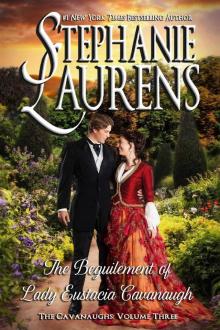 The Beguilement of Lady Eustacia Cavanagh: The Cavanaughs Volume 3
The Beguilement of Lady Eustacia Cavanagh: The Cavanaughs Volume 3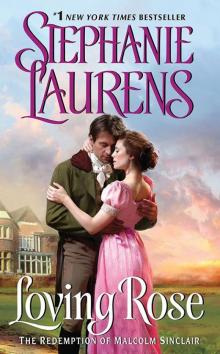 Loving Rose: The Redemption of Malcolm Sinclair (Casebook of Barnaby Adair)
Loving Rose: The Redemption of Malcolm Sinclair (Casebook of Barnaby Adair) By Winter's Light
By Winter's Light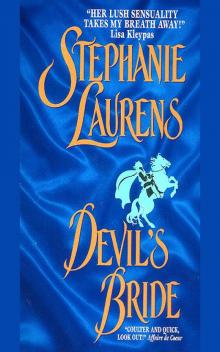 Devil's Bride
Devil's Bride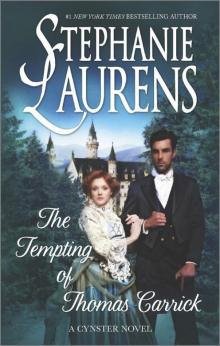 The Tempting of Thomas Carrick
The Tempting of Thomas Carrick![Cynster [22.00] A Match for Marcus Cynster Read online](http://i1.bookreadfree.com/i/03/16/cynster_[22_00]_a_match_for_marcus_cynster_preview.jpg) Cynster [22.00] A Match for Marcus Cynster
Cynster [22.00] A Match for Marcus Cynster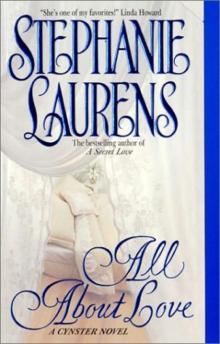 All About Love c-6
All About Love c-6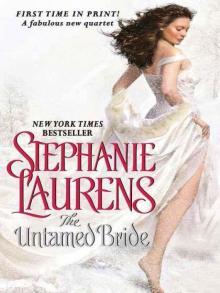 Cobra 01 The Untamed Bride
Cobra 01 The Untamed Bride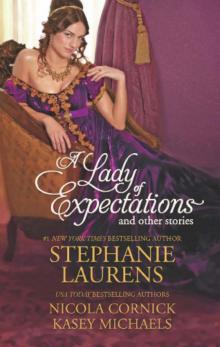 A Lady of Expectations and Other Stories
A Lady of Expectations and Other Stories By Winter's Light_A Cynster Novel
By Winter's Light_A Cynster Novel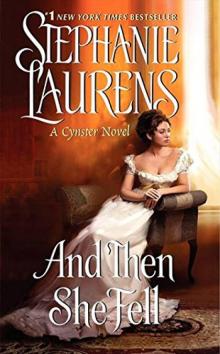 And Then She Fell
And Then She Fell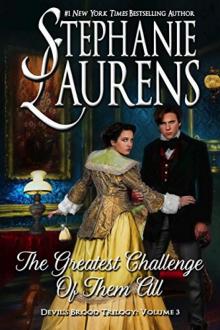 The Greatest Challenge of Them All
The Greatest Challenge of Them All The Edge of Desire
The Edge of Desire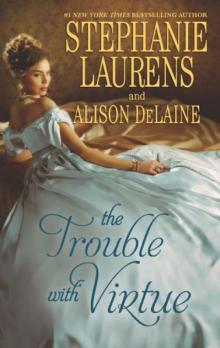 The Trouble With Virtue: A Comfortable WifeA Lady by Day
The Trouble With Virtue: A Comfortable WifeA Lady by Day Fair Juno
Fair Juno THE LEGEND OF NIMWAY HALL: 1750 - JACQUELINE
THE LEGEND OF NIMWAY HALL: 1750 - JACQUELINE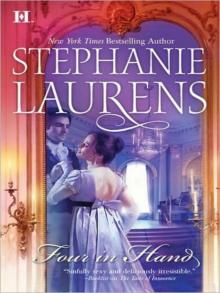 Four In Hand
Four In Hand The Reckless Bride
The Reckless Bride Stephanie Laurens Rogues' Reform Bundle
Stephanie Laurens Rogues' Reform Bundle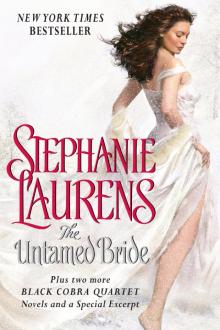 The Untamed Bride Plus Black Cobra 02-03 and Special Excerpt
The Untamed Bride Plus Black Cobra 02-03 and Special Excerpt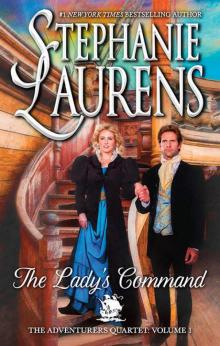 The Lady's Command (Adventurers Quartet #1)
The Lady's Command (Adventurers Quartet #1) The Seduction of Sebastian Trantor
The Seduction of Sebastian Trantor The Daredevil Snared (The Adventurers Quartet Book 3)
The Daredevil Snared (The Adventurers Quartet Book 3)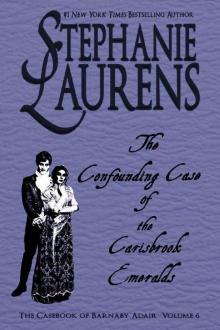 The Confounding Case Of The Carisbrook Emeralds (The Casebook of Barnaby Adair 6)
The Confounding Case Of The Carisbrook Emeralds (The Casebook of Barnaby Adair 6) Lord of the Privateers (The Adventurers Quartet)
Lord of the Privateers (The Adventurers Quartet)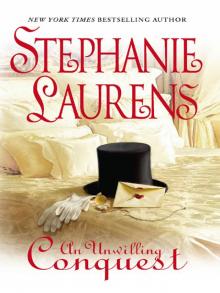 An Unwilling Conquest
An Unwilling Conquest Brazen Bride
Brazen Bride On a Wild Night
On a Wild Night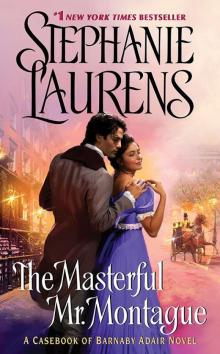 The Masterful Mr. Montague: A Casebook of Barnaby Adair Novel
The Masterful Mr. Montague: A Casebook of Barnaby Adair Novel Lord of the Privateers
Lord of the Privateers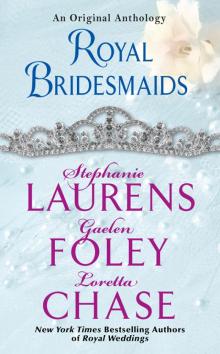 Royal Bridesmaids
Royal Bridesmaids Beyond Seduction
Beyond Seduction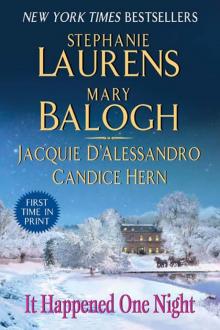 It Happened One Night
It Happened One Night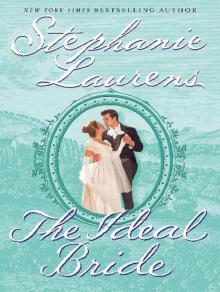 The Ideal Bride
The Ideal Bride The Promise in a Kiss
The Promise in a Kiss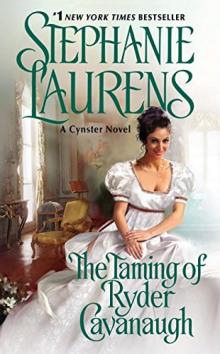 The Taming of Ryder Cavanaugh
The Taming of Ryder Cavanaugh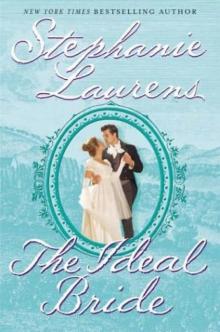 The Ideal Bride c-12
The Ideal Bride c-12 All About Love
All About Love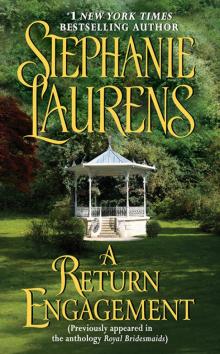 A Return Engagement
A Return Engagement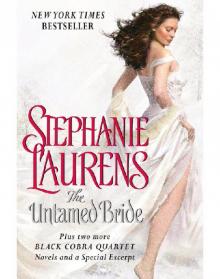 The Untamed Bride Plus Two Full Novels and Bonus Material
The Untamed Bride Plus Two Full Novels and Bonus Material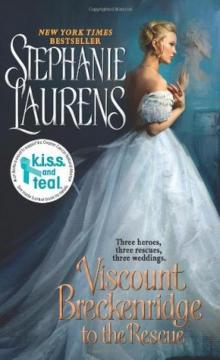 Viscount Breckenridge to the Rescue
Viscount Breckenridge to the Rescue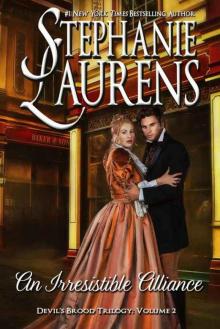 An Irresistible Alliance (Cynsters Next Generation Novels Book 5)
An Irresistible Alliance (Cynsters Next Generation Novels Book 5) The Daredevil Snared
The Daredevil Snared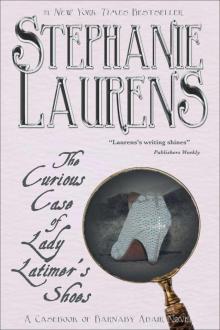 The Curious Case of Lady Latimer's Shoes: A Casebook of Barnaby Adair Novel
The Curious Case of Lady Latimer's Shoes: A Casebook of Barnaby Adair Novel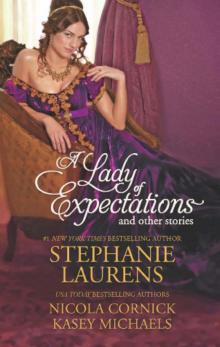 A Lady of Expectations and Other Stories: A Lady of ExpectationsThe Secrets of a CourtesanHow to Woo a Spinster
A Lady of Expectations and Other Stories: A Lady of ExpectationsThe Secrets of a CourtesanHow to Woo a Spinster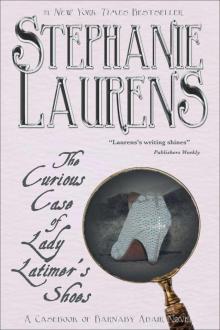 The Curious Case of Lady Latimer's Shoes: A Casebook of Barnaby Adair Novel (The Casebook of Barnaby Adair)
The Curious Case of Lady Latimer's Shoes: A Casebook of Barnaby Adair Novel (The Casebook of Barnaby Adair)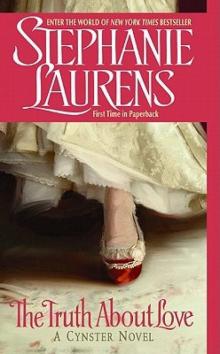 The Truth About Love
The Truth About Love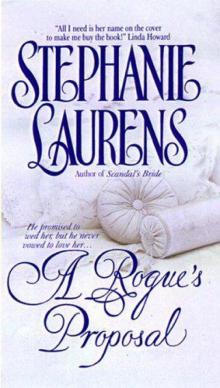 A Rogue's Proposal
A Rogue's Proposal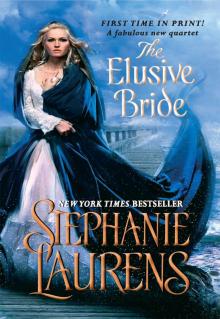 The Elusive Bride
The Elusive Bride The Perfect Lover
The Perfect Lover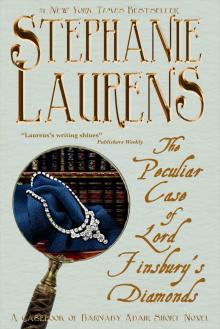 The Peculiar Case of Lord Finsbury's Diamonds: A Casebook of Barnaby Adair Short Novel
The Peculiar Case of Lord Finsbury's Diamonds: A Casebook of Barnaby Adair Short Novel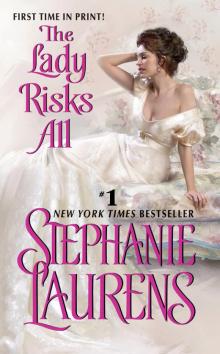 The Lady Risks All
The Lady Risks All The Murder at Mandeville Hall: The Casebook of Barnaby Adair: Volume 7
The Murder at Mandeville Hall: The Casebook of Barnaby Adair: Volume 7 All About Passion
All About Passion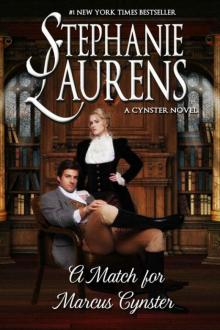 A Match for Marcus Cynster
A Match for Marcus Cynster By Winter's Light: A Cynster Novel (Cynster Special Book 2)
By Winter's Light: A Cynster Novel (Cynster Special Book 2)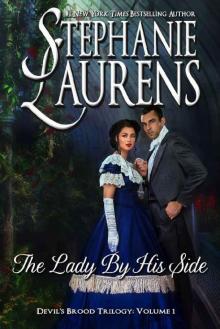 The Lady By His Side
The Lady By His Side The Pursuits of Lord Kit Cavanaugh
The Pursuits of Lord Kit Cavanaugh Tangled Reins
Tangled Reins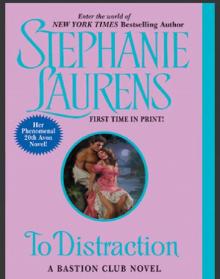 To Distraction
To Distraction A Rake's Vow
A Rake's Vow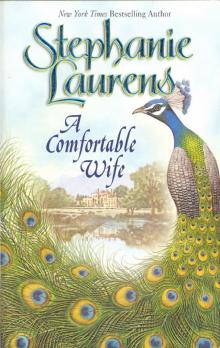 A Comfortable Wife
A Comfortable Wife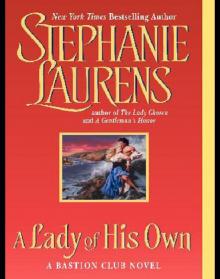 A Lady of His Own bc-3
A Lady of His Own bc-3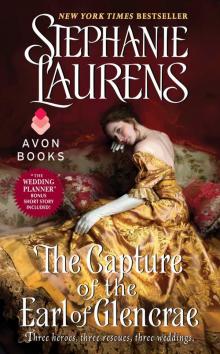 The Capture of the Earl of Glencrae
The Capture of the Earl of Glencrae Scandals Bride c-3
Scandals Bride c-3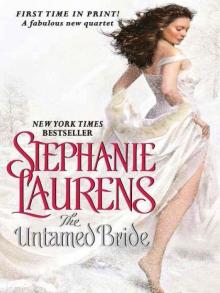 Untamed Bride
Untamed Bride The Brazen Bride
The Brazen Bride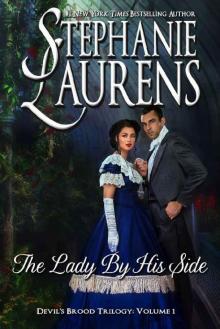 The Lady By His Side (Cynsters Next Generation Novels Book 4)
The Lady By His Side (Cynsters Next Generation Novels Book 4)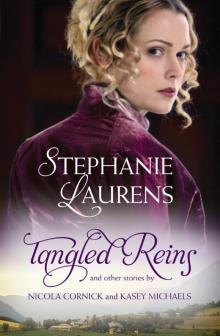 Tangled Reins and Other Stories
Tangled Reins and Other Stories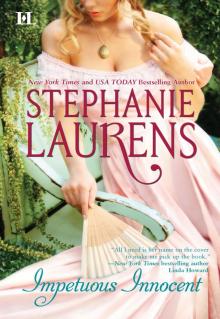 Impetuous Innocent
Impetuous Innocent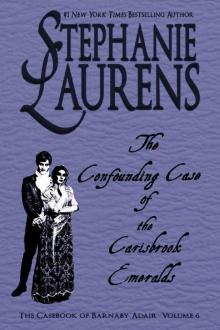 The Confounding Case Of The Carisbrook Emeralds
The Confounding Case Of The Carisbrook Emeralds Stephanie Laurens - B 6 Beyond Seduction
Stephanie Laurens - B 6 Beyond Seduction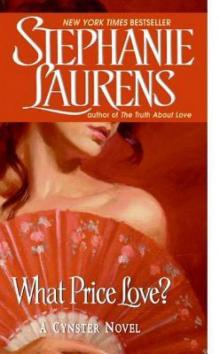 What Price Love?
What Price Love? A Fine Passion
A Fine Passion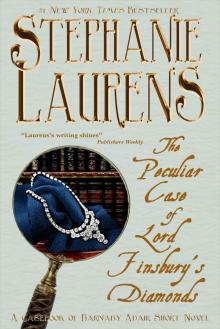 The Peculiar Case of Lord Finsbury's Diamonds: A Casebook of Barnaby Adair Short Novel (The Casebook of Barnaby Adair)
The Peculiar Case of Lord Finsbury's Diamonds: A Casebook of Barnaby Adair Short Novel (The Casebook of Barnaby Adair) Where the Heart Leads
Where the Heart Leads The Designs of Lord Randolph Cavanaugh
The Designs of Lord Randolph Cavanaugh A Secret Love c-5
A Secret Love c-5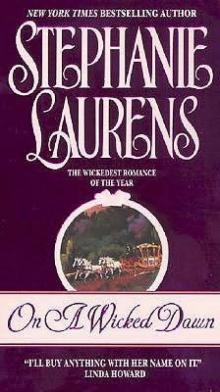 On a Wicked Dawn c-10
On a Wicked Dawn c-10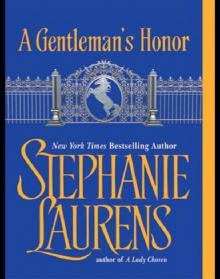 A Gentleman's Honor
A Gentleman's Honor THE LEGEND OF NIMWAY HALL_1750_JACQUELINE
THE LEGEND OF NIMWAY HALL_1750_JACQUELINE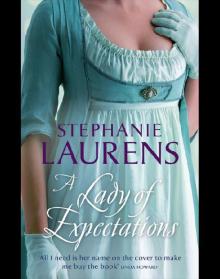 A Lady of Expectations
A Lady of Expectations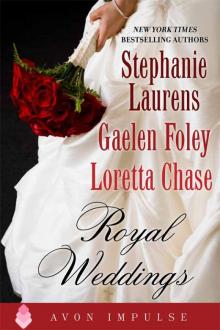 Royal Weddings: An Original Anthology
Royal Weddings: An Original Anthology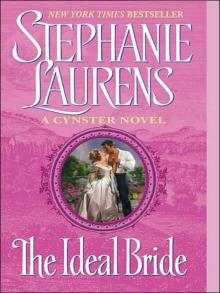 The Ideal Bride (Cynster Novels)
The Ideal Bride (Cynster Novels) Mastered by Love
Mastered by Love A Buccaneer at Heart
A Buccaneer at Heart Captain Jack’s Woman / A Gentleman's Honor
Captain Jack’s Woman / A Gentleman's Honor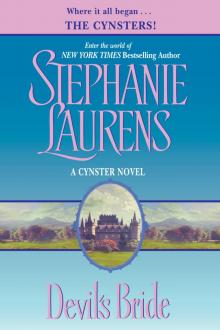 Devil's Bride with Bonus Material
Devil's Bride with Bonus Material A Lady of His Own
A Lady of His Own A Secret Love
A Secret Love Melting Ice
Melting Ice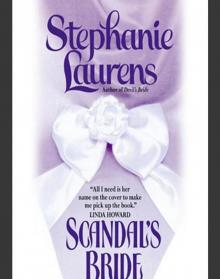 Scandal's Bride
Scandal's Bride Lady Osbaldestone’s Christmas Goose
Lady Osbaldestone’s Christmas Goose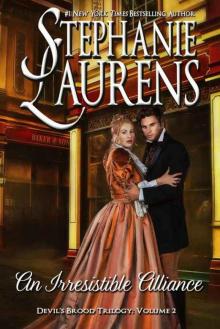 An Irresistible Alliance
An Irresistible Alliance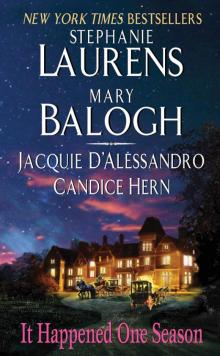 It Happened One Season
It Happened One Season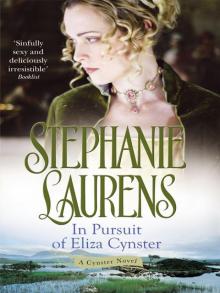 In Pursuit Of Eliza Cynster
In Pursuit Of Eliza Cynster Captain Jack's Woman
Captain Jack's Woman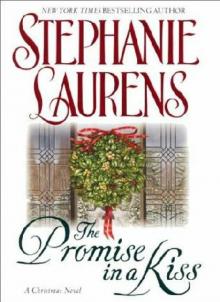 The promise in a kiss c-8
The promise in a kiss c-8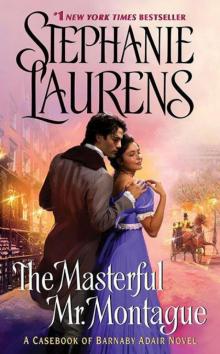 The Masterful Mr. Montague
The Masterful Mr. Montague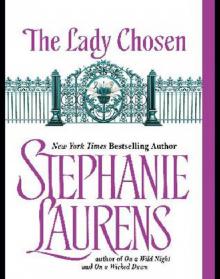 The Lady Chosen
The Lady Chosen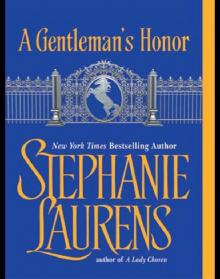 A Gentleman's Honor bc-2
A Gentleman's Honor bc-2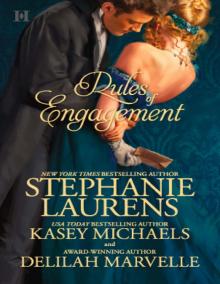 Rules of Engagement: The Reasons for MarriageThe Wedding PartyUnlaced (Lester Family)
Rules of Engagement: The Reasons for MarriageThe Wedding PartyUnlaced (Lester Family) Secrets of a Perfect Night
Secrets of a Perfect Night The Taste of Innocence
The Taste of Innocence On A Wicked Dawn
On A Wicked Dawn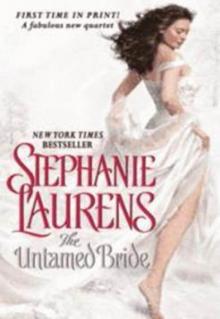 The Untamed Bride
The Untamed Bride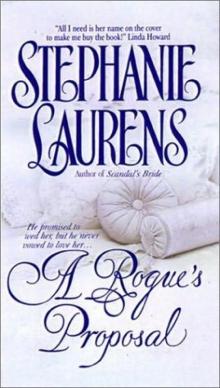 A Rogues Proposal c-4
A Rogues Proposal c-4 Rakes Vow c-2
Rakes Vow c-2 Devils Bride c-1
Devils Bride c-1 Hero, Come Back
Hero, Come Back On a Wild Night c-8
On a Wild Night c-8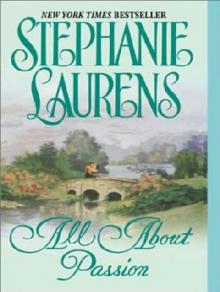 All About Passion c-7
All About Passion c-7